Reagan-Era AIDS Activists Call for New ACT UP-Style Movement for Trans Liberation
In an exclusive interview, two prominent members of ACT UP, which has been credited with saving millions of lives, hope to inspire younger LGBTQ activists to embark on a bold trans liberation movement
![Activists hold a protest outside a hospital with a large backdrop explaining the AIDS crisis. "Welcome to AIDS care in LA County.. Take a number and wait... Proposed available beds 20... [Unreadable]. Signs saying AIDS UNIT NOW, Life Depends On It!! Some of the activists have dressed up like TV announcers or contestants. The backdrop lists several names. "Dana, Antonovich, Schabarum" Activists hold a protest outside a hospital with a large backdrop explaining the AIDS crisis. "Welcome to AIDS care in LA County.. Take a number and wait... Proposed available beds 20... [Unreadable]. Signs saying AIDS UNIT NOW, Life Depends On It!! Some of the activists have dressed up like TV announcers or contestants. The backdrop lists several names. "Dana, Antonovich, Schabarum"](https://substackcdn.com/image/fetch/w_2400,c_limit,f_auto,q_auto:good,fl_progressive:steep/https%3A%2F%2Fsubstack-post-media.s3.amazonaws.com%2Fpublic%2Fimages%2Fc37bf069-b285-495b-9a0d-a36da90fd69d_2919x2052.jpeg)
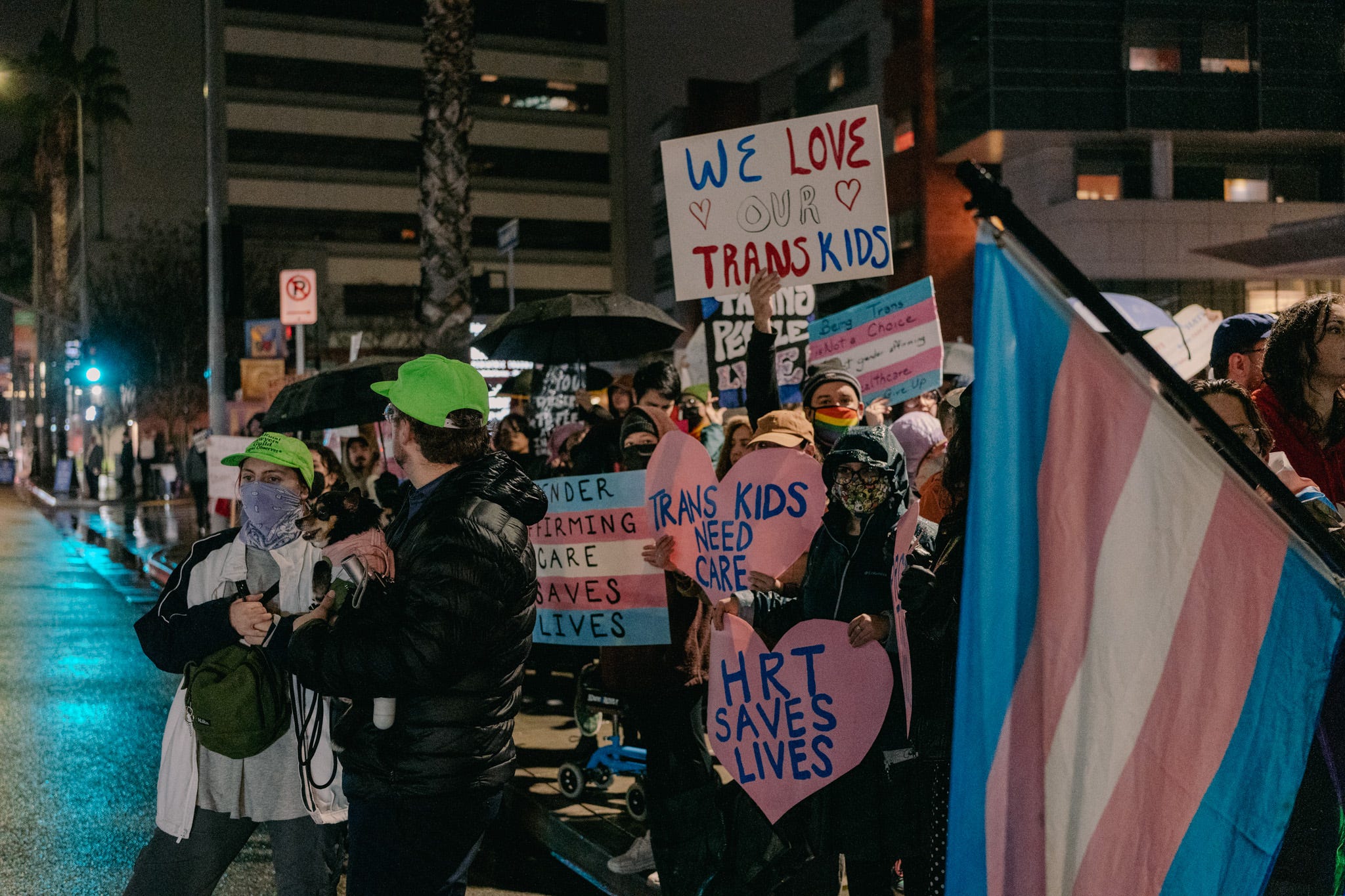
ACT UP, an acronym for “AIDS Coalition To Unleash Power”, formed as an autonomous and decentralized AIDS liberation movement in the late 1980’s. The movement spread to cities across the country after tens of thousands of gay and transgender people had died to AIDS due to inaction from the Reagan administration.1 Nearly everyone in ACT UP either had HIV/AIDS or was close to someone with HIV/AIDS, which meant that members had very little to lose and everything to gain.
In 1987, when ACT UP was created, an HIV infection meant certain death for its victims, who were often ostracized from public life by employers, hospitals, businesses, and even family members due to bigotry and misinformation about how the virus spread. Local governments provided AIDS patients little to no palliative healthcare or financial assistance, and under Reagan, the federal government funded research to stop the disease at a snail’s pace.
By the time ACT UP wound down in the late 90’s, the group’s activism had precipitated the development of several highly effective antiretroviral treatments that ensured HIV would no longer be a death sentence to those who could access them. Activists also forced hospitals to expand treatment of AIDS patients, campaigned against the extreme prices of antiretroviral drugs set by pharmaceutical companies, won protections against AIDS discrimination in the Americans with Disabilities Act, dispelled popular myths that stigmatize people living with HIV, and pioneered new ethical standards in clinical trials that continue to this day. Overall, the movement has been credited with saving the lives of over 23 million people globally, making ACT UP one of the most effective humanitarian and civil rights organizations to have ever existed.
ACT UP LA activists preserving their history
Sadly, few people today are aware of the sheer power and effectiveness of ACT UP, whose total membership numbered somewhere in the thousands at its peak. In order to preserve queer activist history and pass on the legacy, some early ACT UP LA members have been interviewing dozens of living ACT UP activists as part of an oral history project.
MadyCast News interviewed two of the activists running this project, Helene Schpak and Jordan Peimer, to hear the lessons they learned from their movement and pass on suggestions they heard from AIDS activists in their interviews to queer activists today.
Helene and Jordan told us that many AIDS activists are now approaching old age and poor health, underscoring the importance of preserving their stories. Some were in end-of-life facilities or hospice care during their interviews, and one interviewee sadly passed away before their scheduled interview date.
The aging ACT UP community speaks up
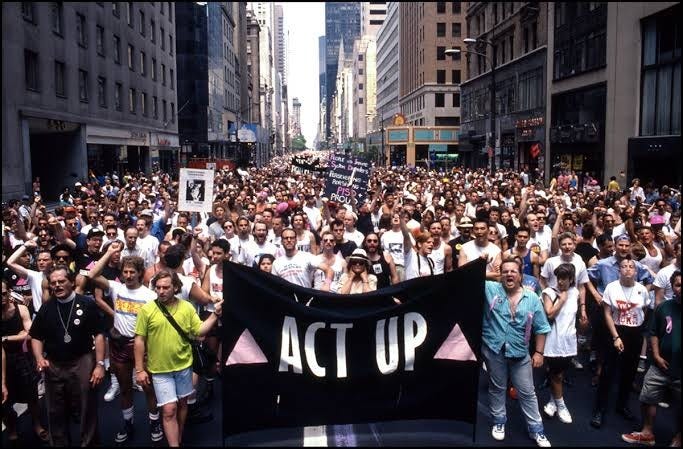
The leaders of the oral history project emphasized that one particular idea was brought up with passion in nearly every single interview they conducted with former ACT UP activists, no matter their health—trans people need to form a new ACT UP.
Jordan: I mean, the language that they're using now and that they were using then is disgusting. You know perversions. It's the words that are coming out of their mouths are so are so similar, and we're hearing it in our interviews all the time. And we're hearing our interviewees say something like the trans community needs to form an ACT UP and you know, we don't hear it once, we hear it almost every interview.
Kirk W., an AIDS activist who was in hospice care during his interview, became highly animated and passionate on this topic despite his very poor health.
Jordan: Kirk was somebody who did drag as part of his identity, but he was not in any way a trans individual. But he was really forceful in believing that trans people needed to be out there. In the streets standing up for their rights. And this was the strongest language he used in an interview while he was in hospice care. He didn't have a lot of energy, but I think we saw the greatest amount of energy and emotion put behind his sentiments about this.
Helene and Jordan expressed that AIDS activism saved the lives of activists in more ways than one. During the AIDS crisis, LGBTQ+ people faced a mental and physical health crisis at the hands of the government, similar to what the community faces today. Many people felt so overwhelmed they did not engage with activism at all, and chose to resign to their fates.
But Jordan said that people who chose to fight and organize were believed to have had a better chance of surviving the disease. ACT UP was far more than just a protest movement—it was an entire community of marginalized people who organized to keep their chosen families alive.
Jordan: Anecdotally, it was believed that people who were activists lived longer, because they were doing something to empower themselves…You couldn't protest 24/7. But it sure felt like we were protesting 24/7…
You could be in a committee meeting almost every night, every day, every week. There were also dinners after almost every meeting and there were parties and there were social events, and almost every morning, every weekend there was clinic defense, and there was a huge amount of camaraderie around that.
Mutual aid was a huge part of ACT UP activism, as many activists were disabled and unable to work or do basic chores.
Jordan: There was getting together because someone was sick. There was cooking meals for that person and cleaning another person’s house. There was fundraising events because we're paying off somebody's legal fees. There was just, there was so much that was going on, it was, you know, like being an activist was a full time job, and you didn't do it alone.
Activism was also immensely beneficial to the mental well-being of activists, a fact which could help encourage young activists to find strength and resolve through activism today.
Jordan: It's kind of like a drug. It becomes a passion and you know, when you see yourselves really making a difference, you can't help but fall in love with it and really wanna make a change. Most of the people we interview, Mady, tell us that this was the proudest time in their lives. They never felt more vital, more engaged, more useful.2
Similarities and differences compared to today
Although some may feel like the threats queer people experience today are uniquely dangerous, Helene and Jordan believe the threat the queer community faced during the AIDS crisis has much in common with today.
Helene: It was literally life and death. We were getting harsh judgment from politicians and absolutely no help whatsoever. The same thing is going on now. And I think that sense of isolation and being targeted and the oppression is very similar…Another similarity is just how the politicians were denouncing us.
Similar to trans people today, people with AIDS in the 1980’s felt they had few allies in the political establishment. Victims of the virus faced attacks on their healthcare and basic rights from conservative politicians who believed the cruel suffering and death from AIDS was God’s punishment for immorality, while most moderate and liberal politicians ignored their struggles—it was considered politically toxic to defend marginalized groups such as gay people, transgender people, and injection drug users.
Jordan: They always hated gays, but it wasn't until AIDS that they then can put us in a whole other category. Then we saw a lot of legislation around that. Lyndon LaRouche wanted to put us in concentration camps.
The activists said there are several notable differences between the circumstances of today and of the AIDS crisis. Police are far more militarized and aggressive today than in the past, which heightens the danger of protests involving civil disobedience. On the other hand, social media and texting has made secure communication across large groups of people far easier, a crucial component to building a movement that was far harder when activists had to rely on landline phones and physical mail to organize.
A roadmap for queer activists today
Jordan and Helene offered concrete advice for activists looking to form a new ACT UP-style movement in the interview. The highly strategic nature of ACT UP played a huge factor in its success, and the advice and history from the previous generation of activists may help inspire younger activists who feel powerless in the face of an increasingly tyrannical government.
The following section describes the general strategy that powered ACT UP’s effectiveness, drawing from our interview with the activists as well as historical documents and records of the group’s accomplishments. Bookmark this link to jump to it later.
Organization and art:
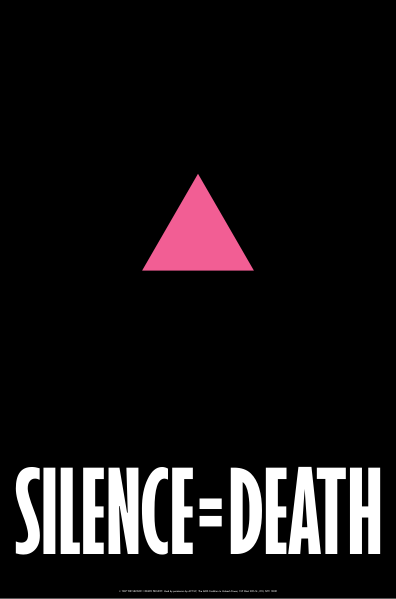
The famous “SILENCE = DEATH” poster created by AIDS activists is a powerful example of how art and slogans can energize a movement. The poster famously includes a pink triangle, a reference to the symbol the Nazis branded gay men with during the Holocaust. Wikimedia. Helene and Jordan stressed the importance of having an organization with a catchy and memorable name that is accompanied with powerful art and slogans dedicated to the specific cause of trans liberation. An organization for direct action outside of nonprofits or unrelated activist groups creates a space for every trans activist to find a community of like-minded people who dedicate their energy towards saving their lives.
Jordan and Helene also emphasized the importance of having a memorable name and powerful art nationwide to brand the movement, which can then be used by autonomous groups in different parts of the country to push the same message at different centers of power—almost like a franchise.Jordan: Use all the [ACT UP] imagery, use everything you can, and then invent for yourselves. Find somebody who is in the media. And work with them to develop the best damn slogans you can get and, you know, create fantastic imagery of your own. We had great visual artists, so many artists that did incredible work and all those images, all the scenes, the slogans, the types of demonstrations that were, you know, staged.3
Targeted actions:
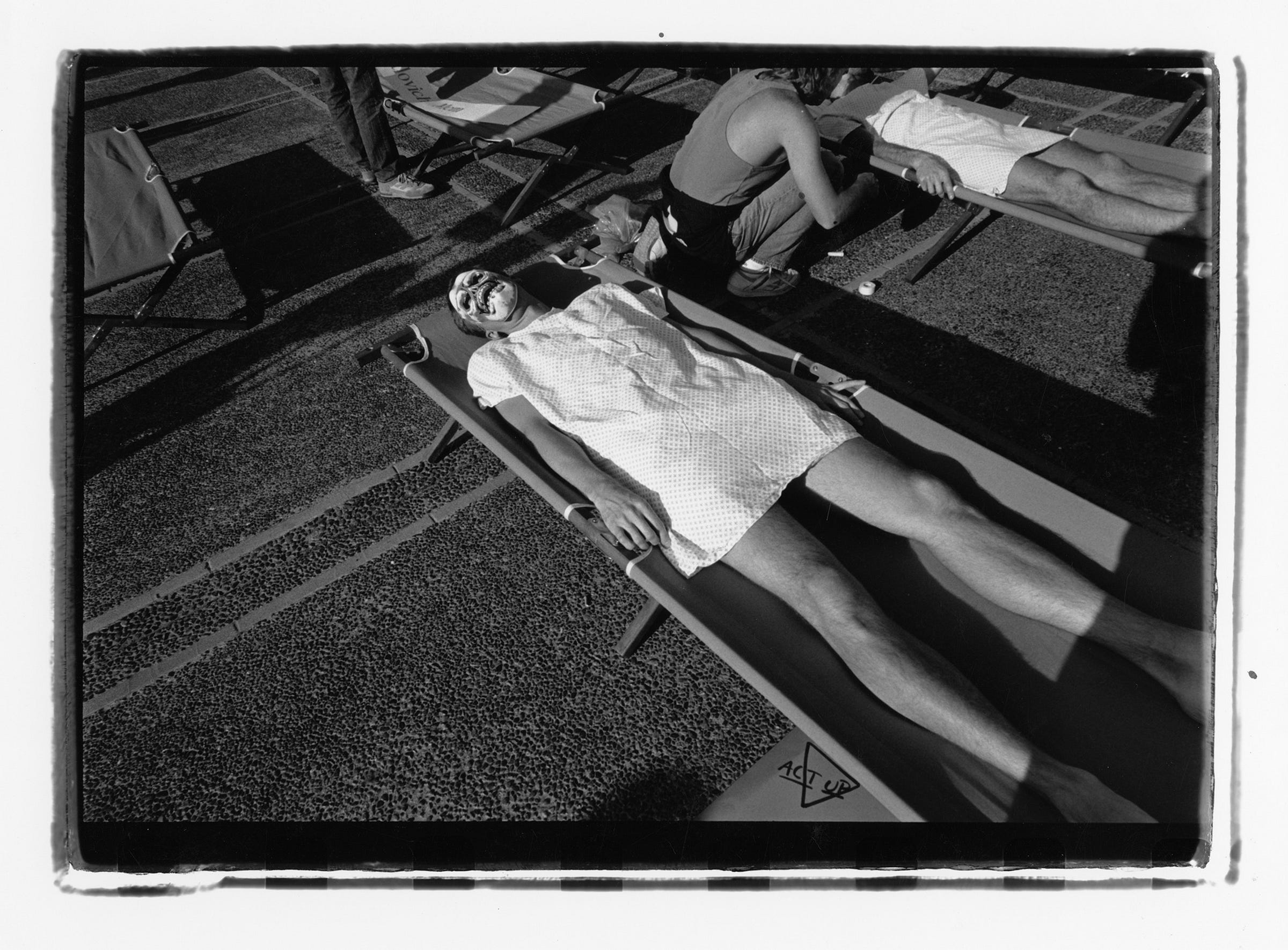
A dramatic protest at LA County/USC Medical Center demanding hospital beds and treatment. The protests at LA hospitals were often accompanied by mutual aid. Photo courtesy of Chuck Stallard ACT UP deployed direct actions on specific targets that harmed their community, such as hospitals, businesses, party conventions, governmental health agencies, or even churches. Each action came with very specific demands from the leadership of their targets, such as an increase in hospital beds, an increase in funding, more ethical practices in clinical trials, or more equitable access to AIDS medication.
ACT UP went far beyond single-day protests or actions, which exert limited pressure. As seen in the photo above, ACT UP LA protested an LA County hospital for an entire whole week, and followed it up with months of targeted actions on that hospital until the county finally acceded to their requests.
The sheer persistence and determination of their actions demonstrates the organizing prowess of the group, which was made possible by their focus on mutual aid. Their hospital protests were accompanied by tents and a soup kitchen to ensure everyone remained energized and fed. I wrote a longer thread documenting some of the actions ACT UP LA took here.
Jordan and Helene warned, however, that the strength of the police state today means the activists must prioritize their safety first when deciding on actions, and some of the actions they took in the past may need to be modified for today’s environment.Helene: I think your personal safety comes first. And then throw as many rocks as you can. Not literally. Well, maybe. But yeah, do watch for your safety and, you know, get away with what you can get away with.
Media strategy:
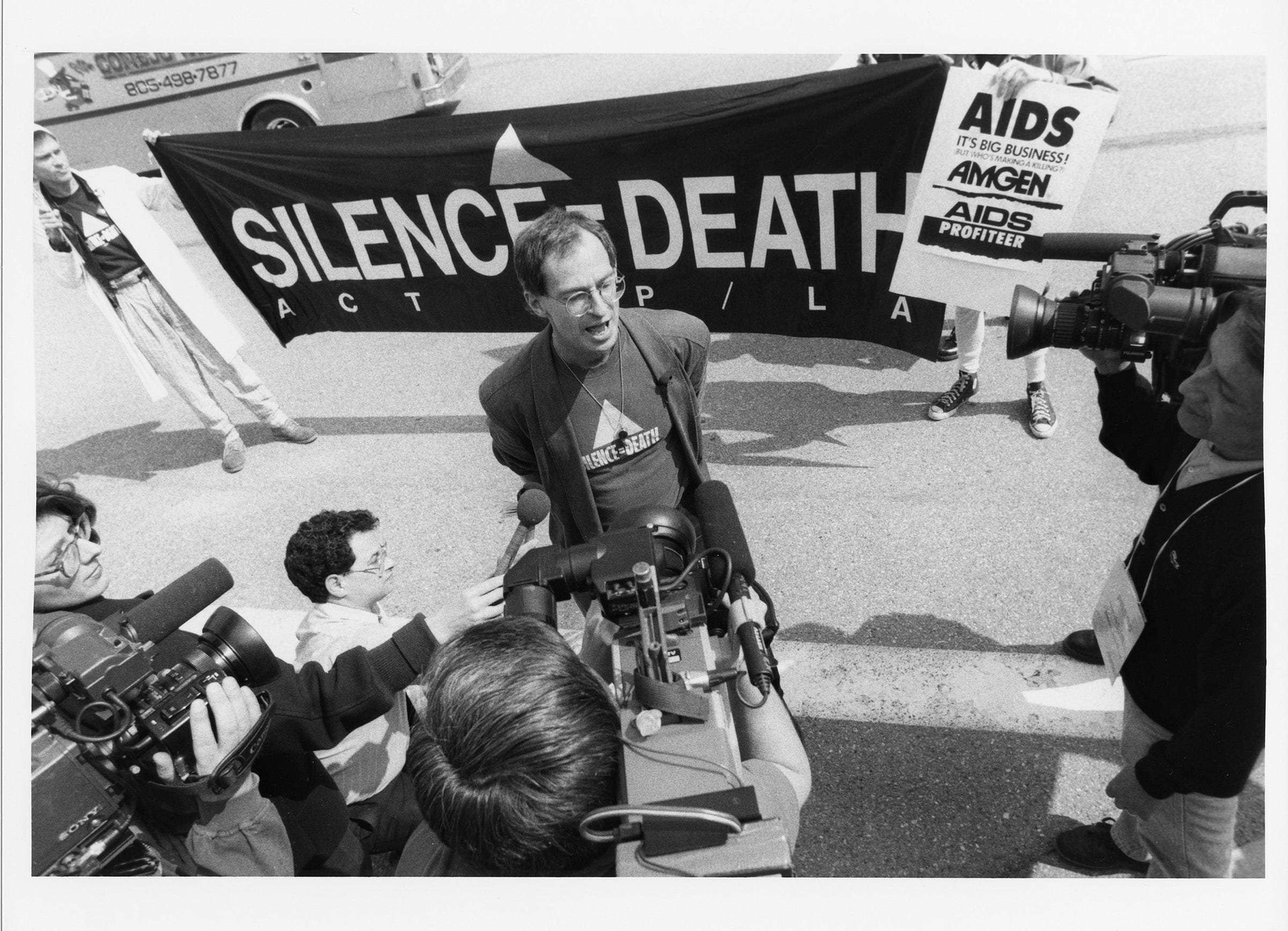
March 3, 1993: David Lacaillade speaking to media at a press conference in Thousand Oaks protesting Amgen pricing of medications. Photo courtesy of Chuck Stallard. Jordan and Helene credited ACT UP’s impressive track record to the highly methodical nature of their organizing. Activists strategically attracted media coverage with dramatic actions to build public pressure. Helene describes other tactics they found effective to prepare for actions:
Helene: We had press releases ready to go, so that we would stay on point
...it's [about] catching the attention of [the] media, but being completely prepared and on point for your follow through. And everybody who was there would have a copy of, you know, a cheat sheet, but … very few people felt comfortable talking to the press.The ability of the movement to build power directly from the actions of even the most poor, disabled, and marginalized individuals accentuated its ability to win concessions from all kinds of leaders. ACT UP successfully pressured city, state, and national politicians, as well as the leaders of governmental health agencies, hospitals, pharmaceutical companies, and even the Catholic Church.
Following through by pressuring leaders in face-to-face meetings:
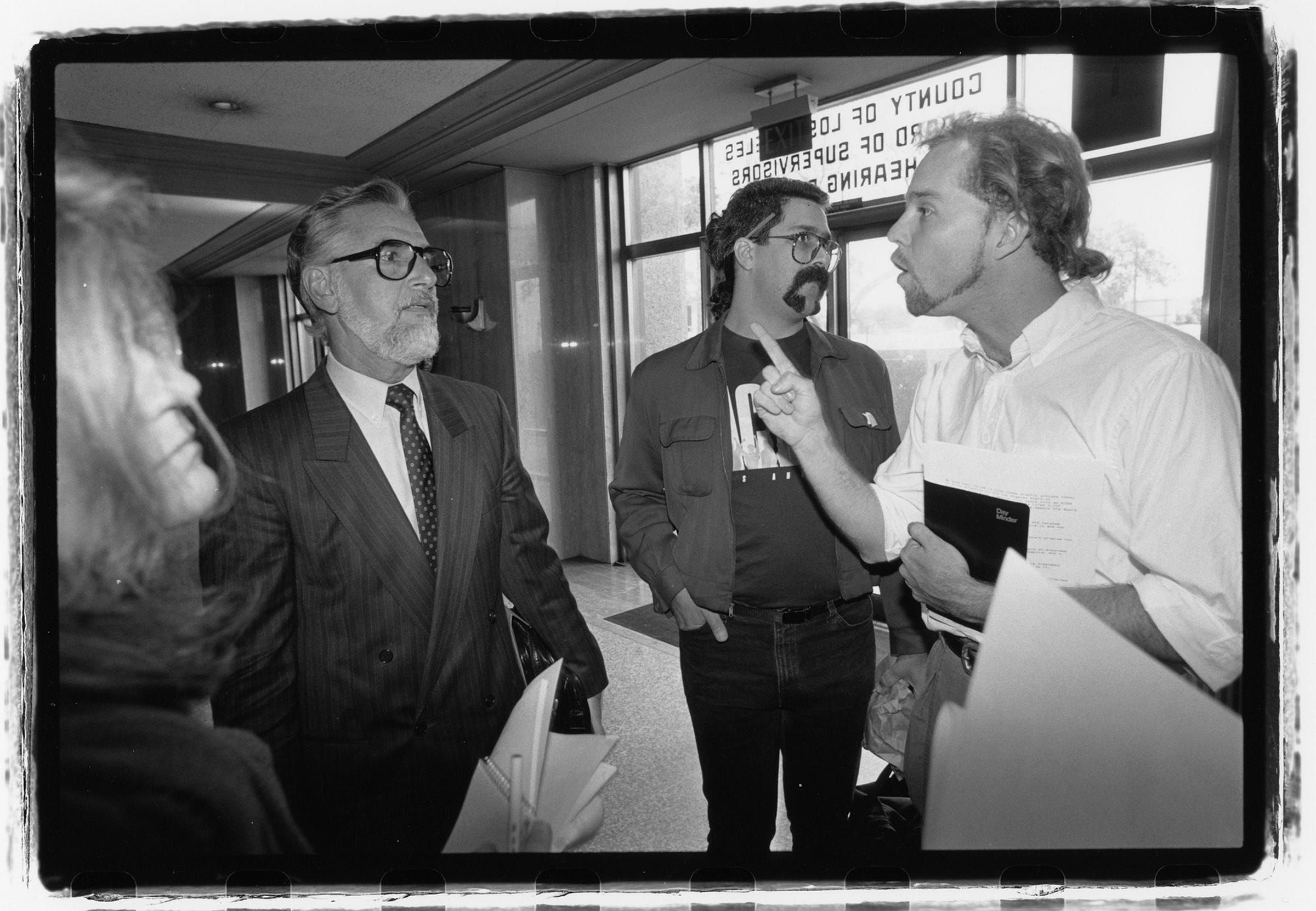
1989 demonstration at Board of Supervisors. John Fall with David Lee Perkins confronting Rabbi Freeling. Photo courtesy Chuck Stallard
Helene and Jordan were emphatic that ACT UP’s direct face-to-face meetings and relationships with politicians and governmental agency heads of both parties ensured that their demands could not be ignored.As an example, Helene mentioned that ACT UP NY’s conversations with Anthony Fauci led to major concessions from the government.
Helene: [Conversations with Fauci] not only changed it for AIDS drug trials and the fast tracking of drugs, but [also] brought a quicker response to COVID… These were one-on-one, face-to-face conversations. Because it forces them to see you as a human being and hear what you have to say. It makes a difference.
The activists believed these meetings should be core to the strategies of activists today, since they force politicians to acknowledge your humanity.
Helene: I strongly recommend getting as much face time [with politicians] as you can and getting in rooms, not letting them have the opportunity of ignoring you… Probably the smartest thing you could do would be to start having those meetings and to make yourself known to legislative aides and make yourself known to the politicians.
Meetings have the largest impact when a powerful group of activists negotiates them and discuss specific topics or legislation, using the media attention and direct actions as leverage.
Helene: It does help if you are representing a group of people. Then they think of it in terms of a voting bloc. And it helps if there is a point of the conversation. So it could be a piece of legislation that you could say, explain to them why it is discriminatory, why it makes no sense. And enough of those conversations could hopefully help break down some shields there.
Commentary: Queer people will survive, again
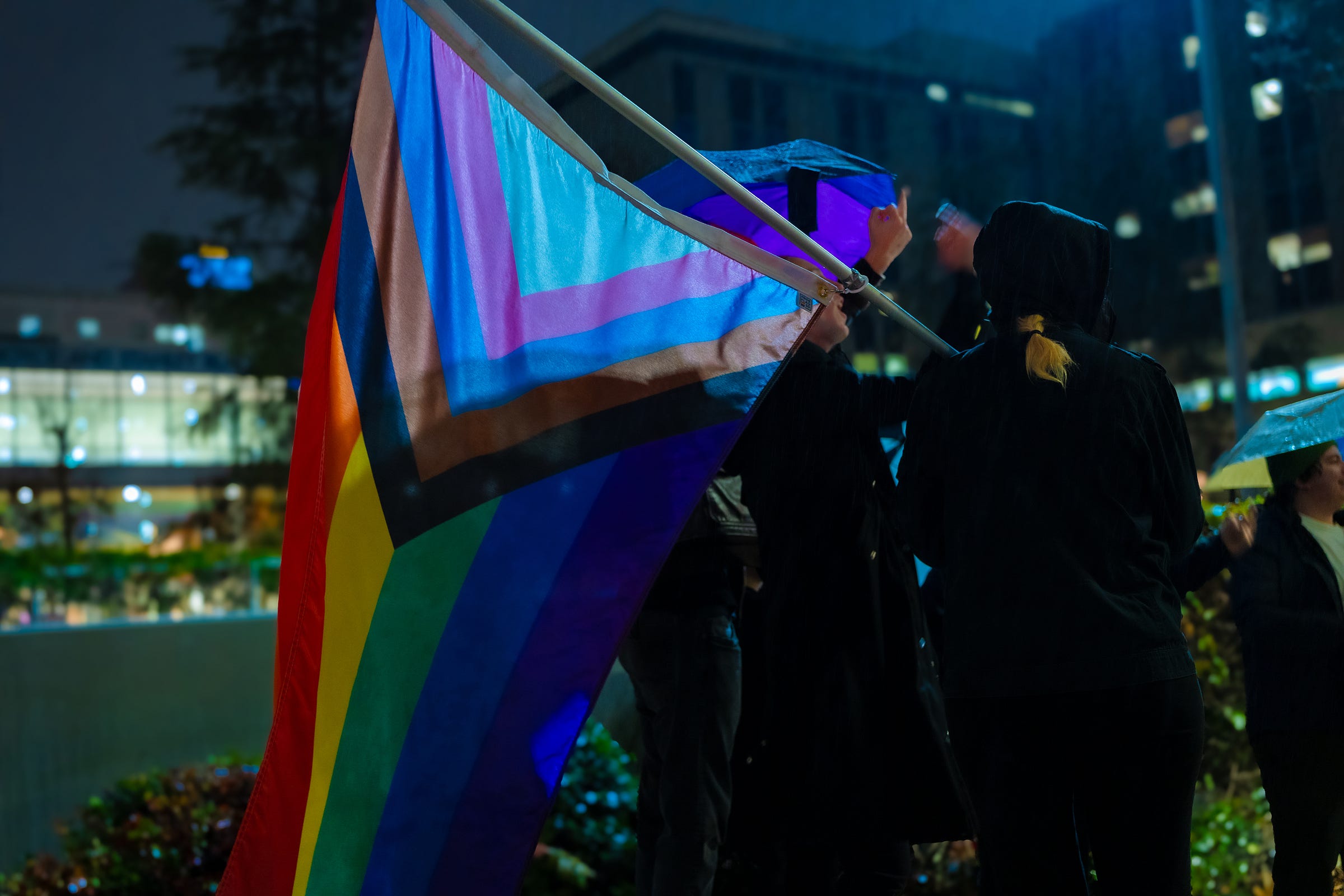
ACT UP can’t be defined by any particular style of action or ideology. Rather, the group is best defined by their unrelenting drive to achieve their goals of ending the AIDS crisis, and their willingness to go to any length that would help reach those goals. The group developed a holistic strategy which combined direct actions and media pressure to create leverage that was used to win major concessions from politicians and other leaders in face-to-face meetings.
The activists won these concessions through 12 years of mass community death and disability under GOP presidents who consistently prioritized the genocidal beliefs of religious extremists over the pleas of scientists and doctors. The persistence of AIDS activists through some of the cruelest circumstances imaginable shows that activists should express their emotions through collective organizing and direct actions.
It’s understandable that many LGBTQ+ people feel overwhelmed by despair and grief to the point many are considering leaving the country. But leaving the country requires a level of money and privilege that the most marginalized and needy people in our communities do not have–we can’t simply leave them behind to fight alone. And the sad reality is we can’t escape from the fact that transgender people will always have to fight for our rights, no matter where we live in the world.
The Republican Party’s war on trans people has declared every LGBT person an activist. Every person should contribute their talents to their communities, whether it’s creating activist art, reporting on LGBTQ+ news as a journalist, providing food or healthcare to people in need, programming tools to track legislation, or organizing your community into a new movement. The best way to save yourself is to save your community.
While covering the Children’s Hospital of Los Angeles protest last night, the air felt full of energy and love in a way that hardly felt possible in times like these. The queer aura whispered to me a prophecy: radical direct action movements are coming back, strong as ever.
— Edited by Socks Whitmore
Special Note from Mady Castigan
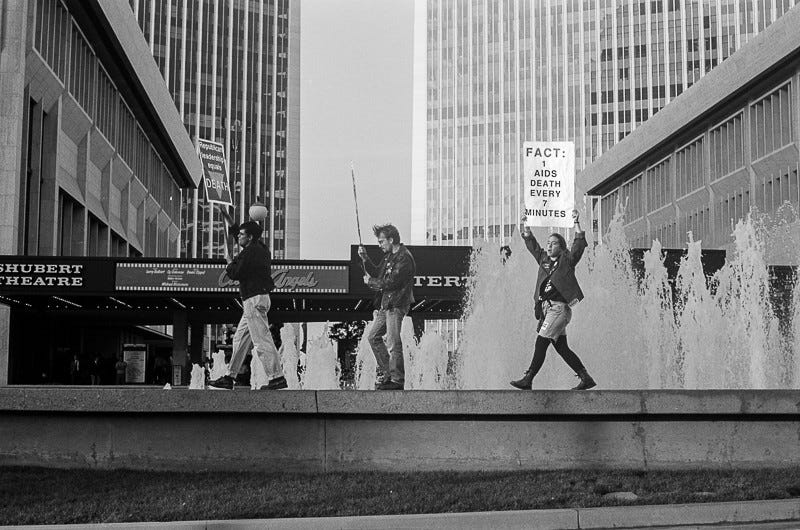
Thank you for reading this article. This article is the product of months of deep research into archival records, books, documentaries, news articles, and other historical sources. As I learned how ACT UP rose through devastation of the AIDS pandemic, I felt an incredible amount of gratitude for the sacrifices and determination of their work. It’s not an exaggeration to say many of us are alive today thanks to the tireless activism of a few thousand queer ACT UP members a few decades ago.
I want to especially show my gratitude to the ACT UP LA activists featured in this article and their open and enthusiastic communications with us over the last few months, as well as the amazing photographers who graciously allowed us to use their photos for this article. Some of the names of ACT UP members who contributed to this article: Helene Schpak, Jordan Peimer, Judy Sisneros, Chuck Stallard. Please keep up to date with the ACT UP LA Oral History Project at their website: https://www.actupla.org/about-us
Please consider sharing or subscribing for free or for paid if you appreciate our work on this article. Socks Whitmore edited this article as the newest contributor to MadyCast News thanks to the generous support of readers like you! We have a community Discord server for paid subscribers, and a Substack chat for everyone.
License: This article’s text (not photos) is licensed with CC-BY 4.0, meaning it can be republished with attribution and link (if digital) to the author, Mady Castigan. We encourage activists to spread the message and convert it to different forms of art, such as zines, graphics and so on. Photos taken by Mady can be licensed for free upon request.
Reagan has been criticized for ignoring the AIDS pandemic at the behest of religious conservatives, exemplified by the time Reagan’s press secretary laughed and made jokes when a reporter asked for the president’s reaction to the crisis.
Author’s note: I want to note that I have personally felt this phenomenon myself through my journalism and activism. Just a few months ago, no one knew who I was outside of my personal life. Today, thousands of people read and share my articles and posts which have created important discussions while helping queer people respond to the crisis. My viral Bluesky thread encouraging hospital protests against hospitals which deny trans healthcare was cited by an organizer of one of the first hospital protests in Virginia, which blew my mind and motivated me more than ever.
But I really want the reader to understand that there’s nothing special about me or AIDS activists or any other activist—any human can make a significant impact on their communities through activism and organizing, even in the most dire of circumstances. And together, an activist community can save an entire nation of people.
The headline photo is a great example of these staged demonstrations!

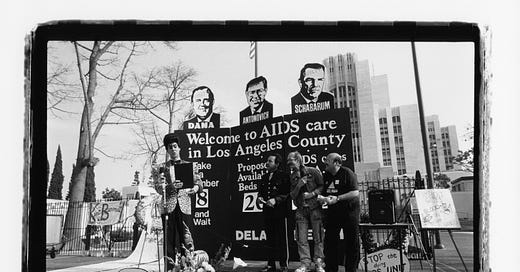


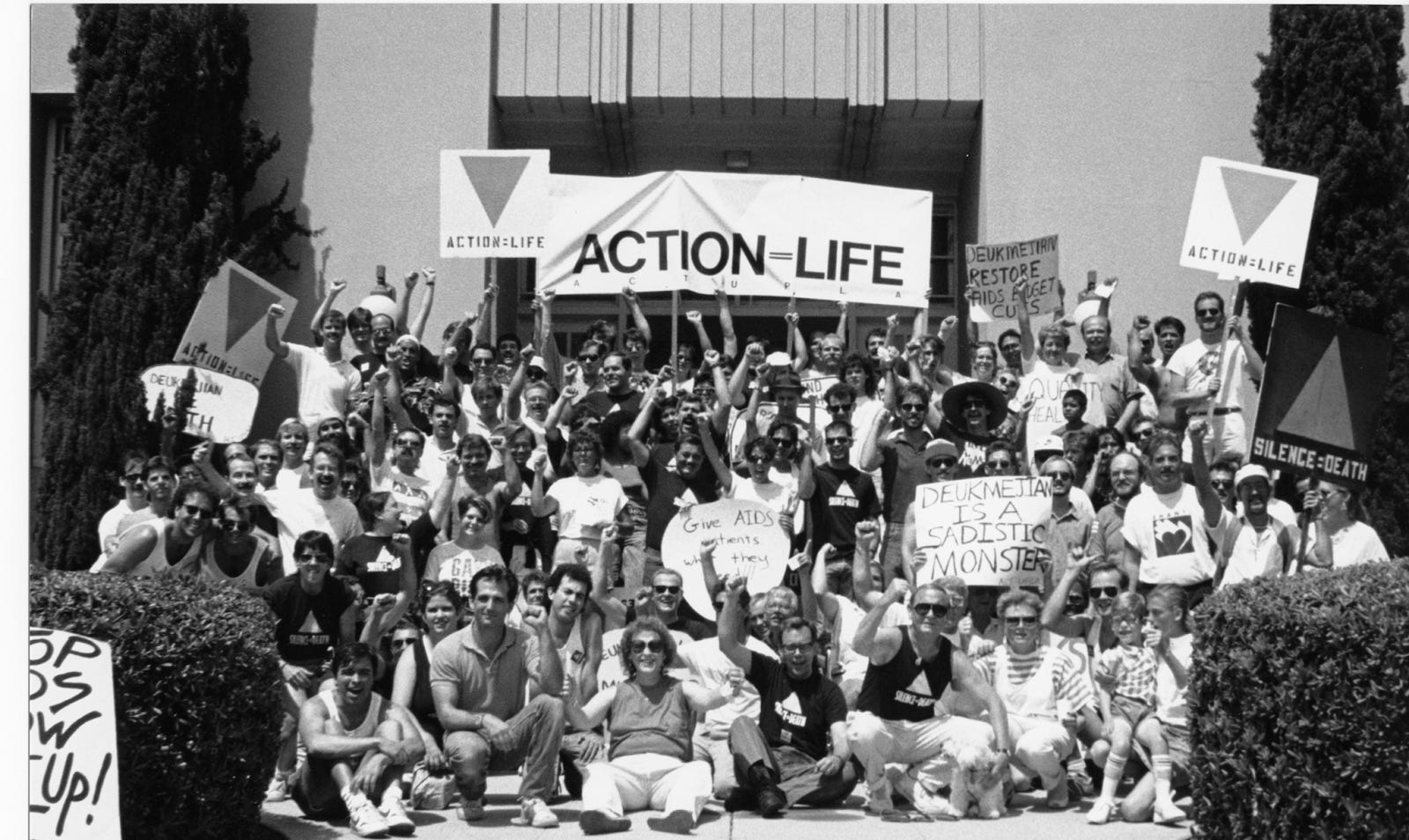
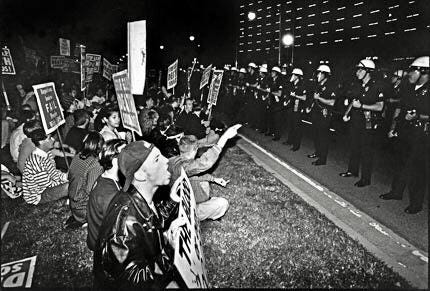

I'm an old '60s-type straight guy guy who remembers Act Up!, who remembers Stonewall, who remembers "We're here, we're queer, get over it." And I needed only the headline to go YES! YES! YES!